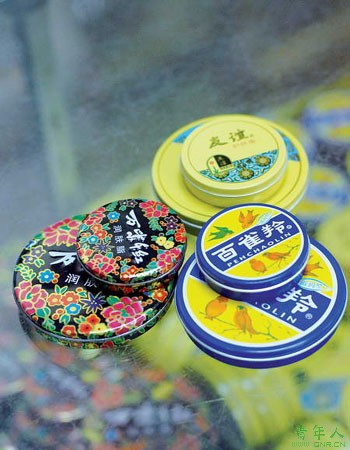
China’s domestic cosmetics industry has hopes for a new appearance after years of being a "second sister" to foreign brands.
Over the past two years, homegrown makeup has gained popularity thanks to websites and shops, sparking a revival.
Googling "homemade cosmetic products forum" turns up 199,000 results, and one in particular, Douban, is a social networking-type website that attracts thousands of fans who discuss and advocate China-made goods and share their experiences.
Bao Xiaohe, a 25-year-old website employee in Beijing, is typical. She said she likes to buy Herborist, a cosmetic brand made by Shanghai Jwaha, "because it’s inexpensive and has good quality," compared with other world leading brands.
Another Beijing resident, Cui Xiaolin who has been selling domestic cosmetics on Taobao, "China’s eBay," said her buyers are from home and abroad and that some foreigners traveling in China are also her customers.
Besides websites, the Chinese face paints, lotions and potions are finding new markets in other ways.
In October, Xiefuchun, a 179-year-old cosmetic brand in Jiangsu Province, reached an agreement with Wal-mart for the products to be sold in around 150 malls. Kongfengchun, a 147-year-old cosmetic maker based in Hangzhou, Zhejiang Province has opened more than 70 shops in Zhejiang since last year, and Beijing-based Miqi which had a strong export market in Japan is now finding success at home.
Shanghai Jahwa, a leading cosmetic producer with the Liushen, Maxam, and Herborist brands, saw a net profit of 145 million yuan ($21.23 million) or up 35.62 percent year on year, and the sales income grew 13.3 percent year on year.
The small upsurge in domestic cosmetics began in 2006 when some foreign brands were found to have quality problems, said Gu Jun, a marketing expert from China Commerce Association for General Merchandise.
In September 2006, Japan-based SK-II was tested and found to contain some unapproved substances in its popular skin care range, followed by other leading world brands such as Clinique, Lancome, Dior and Estee Lauder which were also said to have prohibited substances.
The central government has also encouraged the growth of homemade products, said experts.
In 2008, several ministries issued rules to promote the development of "time-honored shops and brands," and encouraged them to expand financing channels and seek listings, Xiao Mingchao, deputy general manager of Sinomonitor International, told the Global Times.
Obstacles
But despite increasing sales volumes, the cosmetics market of domestic producers is still small compared with that of international enterprises, and experts said it is still too early to say a complete makeover has been achieved.
For example, Maxam, China’s best selling domestic hand cream, has recorded sales of over 300 million yuan ($43.93 million) for several years, and an annual growth of more than 10 percent from last year. But compared with foreign counterparts, the sales are quite small.
Beijing-based CCID Consulting recently predicted that the cosmetics market is expected to hit 200 billion yuan ($29.29 billion) by 2009, and the foreign brands occupy more than 70 percent of the makeup counter. Their domestic counterparts are largely scattered around the medium and low-end markets.
The gross margin for low-end cosmetics is no more than 15 percent, compared with 50 to 80 percent for high-end makeup. In other words, 80 percent of the profits are gained by international brands, reported Nanfang Metropolis News.
In a Wu-mart store by Beijing’s North Fourth Ring Road, domestic cosmetics have their own section, though it is tucked away in a corner and hardly visible to customers at first glance. The eye-catching premier spots are shared by foreign brands, such as Dove and OLAY.
And the foreign brands, such as P&G and L’Oreal are exploring their market share in the third and fourth-tier cities where homemade products are facing more challenges than opportunities.
L’Oreal, the biggest cosmetic enterprise in the world, said in March this year that its China sales income stood at 6.952 billion yuan ($1.02 billion), up 27.7 percent from last year, and it was the eighth time the company saw growth at more than 10 percent. Last year, China was the company’s seventh largest world market.
To deepen its market in China, L’Oreal is expanding the second and third tier cities and the rural markets, particularly with a face cream called Mininurse that sells for between 10 and 20 yuan ($1.47 to $2.93).
Obstructed sales channels, a lack of talent, ineffective marketing and sales strategies, and pricing strategies are bottlenecks for Chinese cosmetic makers looking to peel away the foreign cosmetic mask.
Shi Weidong, a manager at Beijing Yamei Cosmetics, Miqi’s producer, told the Global Times that it was not easy to raise their prices despite rising costs because the prices were established during the planned economy of the 1980s and have barely risen since.
"We can just lift the price by a small margin, not by a large margin, so it’s hard for us to make profits," said Shi. The 22-year-old State-run cosmetics company has had an annual sales income of 13 million yuan ($1.90 million) over the last two years, and is now trying to branch out via the Internet.
Shi said the large entrance fees to enter supermarkets is also a barrier to expansion. "At this point I wouldn’t even go into a supermarket even if I was invited," said Shi.
The low prices make it hard to earn decent profits, explore channels, or advertise to counter foreign brands, said Gu, adding that Kongfengchun has made different attempts and launched high-end products, but its best sellers remain under 10 yuan ($1.47). Shanghai Jahwa also suspended high price strategies due to the financial crisis.
Xiao from Sinomonitor International said the State-owned small and medium enterprises, are still feeling the impact of the old planned economy. "It is hard to gain development if they are still affected by it," said Xiao
责任编辑:sealion1986
